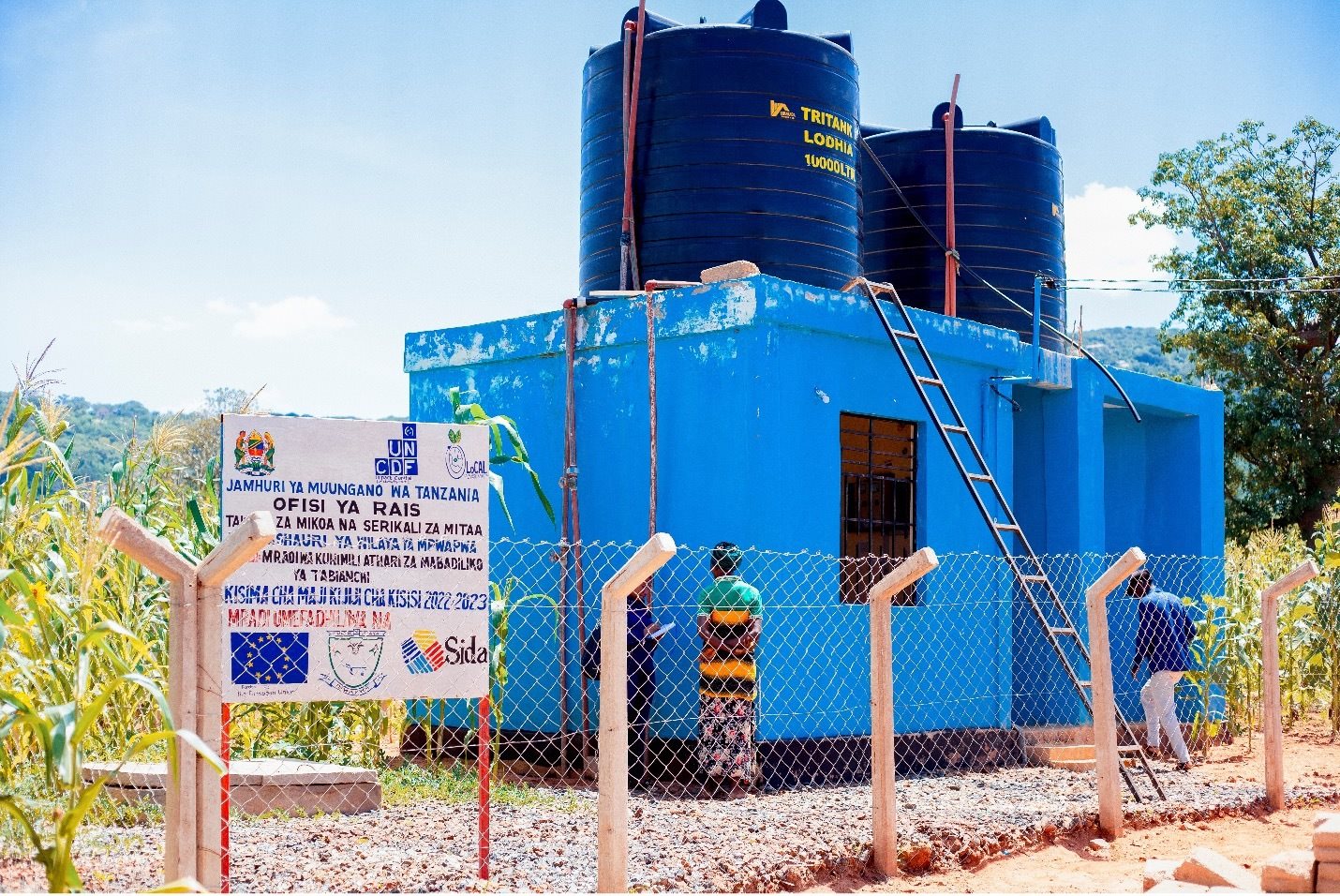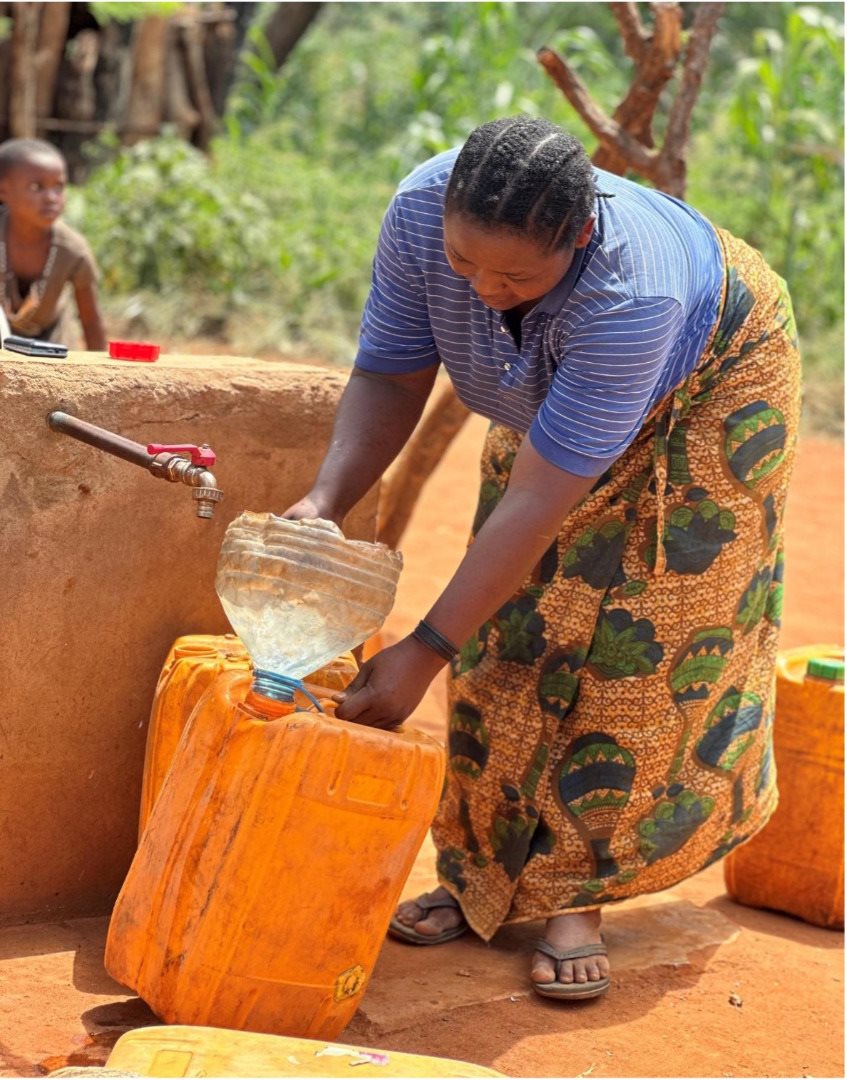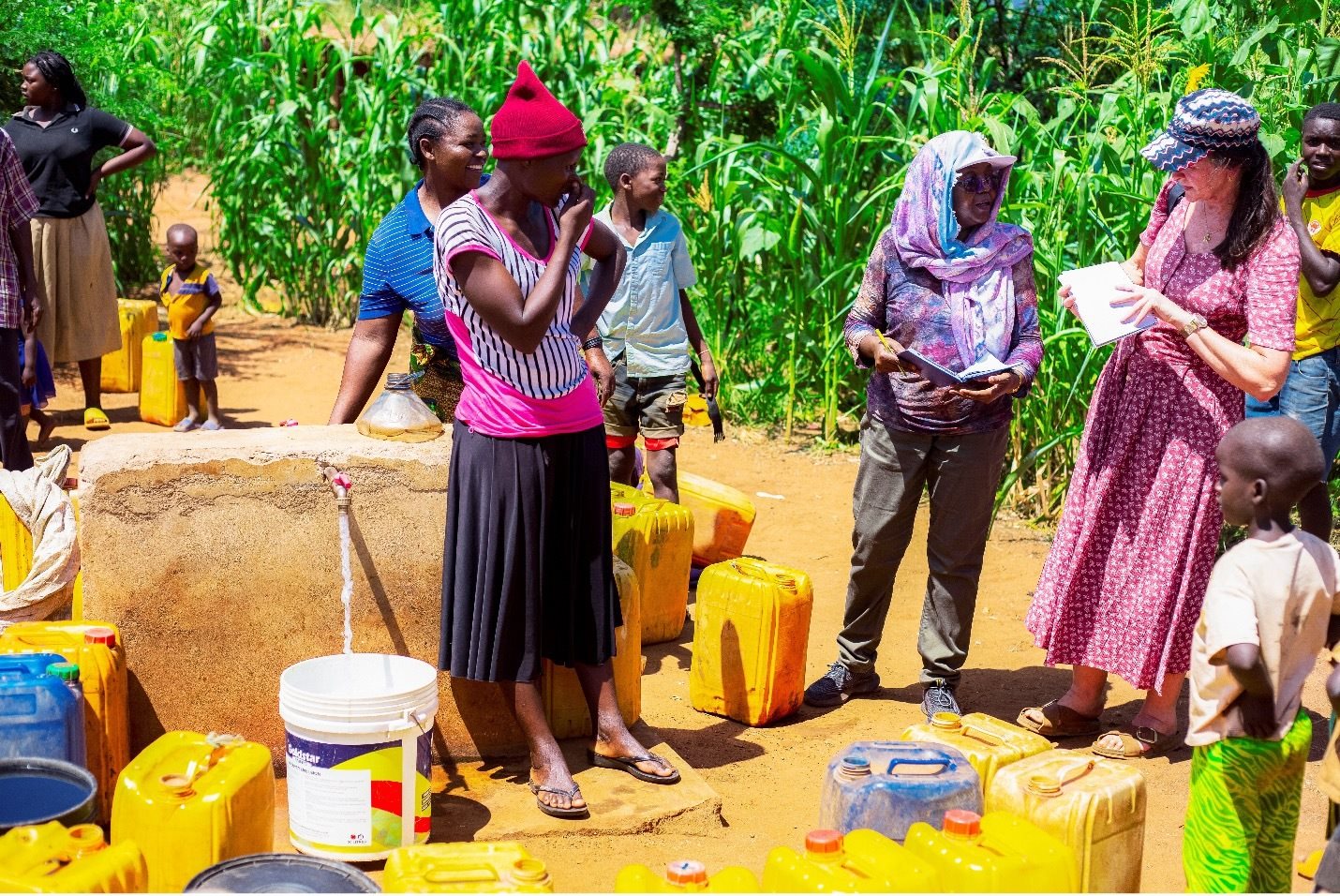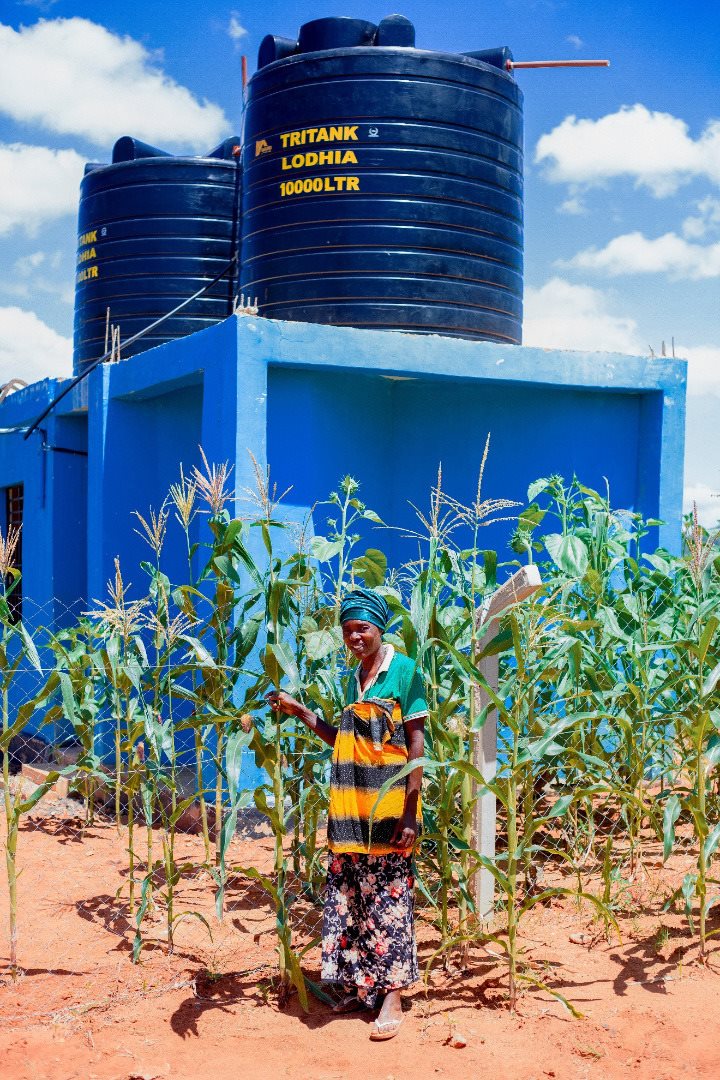Unlocking finance for investment in water infrastructure transforms lives in drought-prone regions of Tanzania
Tags
Fetching and carrying water has swallowed up an increasing number of back-breaking hours from Joyce Stephano’s week as climate change places pressure on limited water resources in Tanzania. The water, scooped from shallow wells, would often leave her and her six children weakened and ill. A grant channeled to her local government through the Local Climate Adaptive Living (LoCAL) Facility – a mechanism designed by the UN Capital Development Fund - has enabled her community to build new infrastructure providing clean water to the community and transform the lives of residents.
 The LoCAL-supported water borehole project in Kisisi village, Mpwapwa District, Dodoma region, Tanzania
The LoCAL-supported water borehole project in Kisisi village, Mpwapwa District, Dodoma region, Tanzania
Ms Stephano is one of hundreds of thousands of women in Tanzania benefitting from three LoCAL pilots in the increasingly drought-prone Dodoma Region, actions funded by the European Union and Sweden. She enjoys better health and more time to pursue other income-generating activities and her experience could soon be replicated in more communities in Dodoma region and 6 districts along the coast as LoCAL prepares to expand activities in the coming months with additional support from Belgium, EU and Norway.
Speaking from Kisisi Village in Mpwapwa District in the Dodoma Region, Ms Stephano, who is 52, marvels at how this small investment in water infrastructure has transformed her life and given her the opportunity to boost her family’s income by pursuing new economic activities.
“Previously, our daily routine involved embarking on a perilous 12-kilometre journey to reach distant shallow wells, where the water was neither safe nor clean, exposing us to significant safety risks and the constant threat of encounters with wild animals. The considerable time spent fetching water, combined with its questionable safety, only heightened our worries,” said Ms Stephano.
Joyce Stephano, a project beneficiary, stands proudly at the LoCAL supported boreholes project in Kisisi village, Mpwapwa District, Dodoma region, Tanzania.
“Thankfully, with water now conveniently accessible nearby, the cumbersome task of long-distance travel has been alleviated. This newfound accessibility has provided us with invaluable time to pursue other economic activities vital for sustaining our families. We are sincerely grateful for this transformative improvement,” she added.
At the core of the LoCAL initiative in Tanzania is the support for communities and Local Government Authorities (LGAs) in identifying and implementing climate change adaptation response priorities. Through capacity-building initiatives, both communities and LGAs gain access to domestic and external financing, facilitating the scaling up of climate change-responsive interventions. Importantly, LoCAL fosters innovative, participatory mechanisms for sustainable climate action while ensuring gender-sensitive approaches.
Designed over ten years ago and now engaged by some 38 countries across Africa, Asia the Caribbean and Pacific, LoCAL aims to bolster climate-resilient communities and local economies. LoCAL offers a standard, internationally recognized mechanism, LoCAL channels climate finance to local government authorities in developing countries, with a particular focus on the Least Developed Countries (LDCs) who identify LoCAL as a target for supporting implementation of countries’ adaptation to climate change in their blueprint for poverty eradication, the Doha Programme of Action. LoCAL also responds to the objectives outlined in the 2015 Paris Agreement and the Sustainable Development Goals (SDGs), notably sustainable cities and communities (SDG 11) and climate action (SDG 13), but also in Tanzania by supporting efforts to eradicate poverty (SDG1) and reduce inequalities (SDG 10).
In Tanzania, LoCAL represents a critical strategy for addressing the adverse impacts of climate change at the local level that works in harmony with national economic, development and climate-action objectives. It aligns with national commitments outlined in the Third Five Year Development Plan (FYDPIII 2021/22-2025/26), the Nationally Determined Contributions (NDCs), and the National Climate Change Response Strategy (NCCRS 2021-2026). Moreover, LoCAL complements the United Nations Sustainable Development Cooperation Framework (UNSDCF 2022-27), particularly the Planet Outcome.
The urgency of climate action in Tanzania is underscored by the National Climate Change Response Strategy (NCCRS 2021-2026), which identifies escalating climatic factors as a threat to food production, water access, and energy generation among other sectors. The projected economic costs of addressing climate change impacts by 2030 could amount to 1 to 2% of GDP annually, highlighting the imperative for proactive measures. LoCAL represents a pivotal strategy for enhancing adaptive capacity, with an initial estimate of immediate financing needs totalling approximately USD 150 million globally.

Christina Michael, a beneficiary of the LoCAL project, fills her gallon with clean water from the LoCAL-supported borehole water connection project in Kisisi village, Mpwapwa District, Dodoma region, Tanzania.
At the core of the LoCAL initiative in Tanzania is the support for communities and Local Government Authorities (LGAs) in identifying and implementing climate change adaptation response priorities. Through capacity-building initiatives, both communities and LGAs gain access to domestic and external financing, facilitating the scaling up of climate change-responsive interventions. Importantly, LoCAL fosters innovative, participatory mechanisms for sustainable climate action while ensuring gender-sensitive approaches for effective adaptation strategies in the LDCs.
“Providing financial and technical capacities to Local Government Authorities in Tanzania is a key to advancing sustained climate change adaptation action at the local level,” said Rogasian Rukoa, Principal Forest Officer, President’s Office Regional Administration and Local Governments (PORALG).
In practice, LoCAL in Tanzania focuses on enhancing local government and community capacities to respond to climate impacts while integrating adaptation measures into LGAs planning and budgeting systems. By supporting climate-resilient investments, LoCAL contributes to local economic development, particularly for marginalized people such as young people and women. The introduction of Performance-Based Climate Resilience Grants (PBCRGs) mechanism further strengthens the country's climate finance opportunities.
UNCDF acknowledges the financial support and partnership from the European Union (EU), Sweden, Norway and Belgium who are all keen to advance the LoCAL agenda in Tanzania, in Dodoma and the coastal regions of Tanzania mainland. In partnership with the Government of Tanzania, critical collaborations with implementing partners such as the President's Office Regional Administration and Local Government (PORALG) have been established.

A collaborative effort: NORAD Technical Team, PORALG, and UNCDF representatives visit a LoCAL-supported project in Kisisi village, Mpwapwa District, Dodoma region, Tanzania
The impact of LoCAL is tangible in pilot districts such as Chamwino, Kondoa, and Mpwapwa. Through the effective disbursement of Climate Change Adaptation (CCA) funds via the PBCRG mechanism, these districts have implemented transformative projects. An Annual Performance Assessment, an integral part of the standardized LoCAL approach, identified positive results from the pilots in Mpwapwa, Chamwino and Kondoa.
In Mpwapwa, the drilling of boreholes and construction of water supply networks have significantly enhanced access to safe water, particularly benefiting women like Ms Stephano and children. In Chamwino, the solar-powered Chiboli Irrigation Scheme is poised to bolster food security and climate resilience for hundreds of smallholder farmers. Similarly, in Kondoa, the rehabilitation of the Kisese Dissa water scheme has not only improved access to clean water but also enhanced agricultural productivity and environmental sustainability.
Looking ahead, UNCDF endeavours to expand its reach and deepen its impact with LoCAL in 2024 and beyond, ensuring that more communities across Tanzania can thrive in the face of climate change.
Find out more about LoCAL here
Thanks to the support of our partners:









